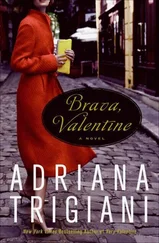My heart sinks as I look at a pile of submissions: shoe boxes, some FedExed, others hand-delivered, dropped in the corner like rejects on their way to the garbage. I cannot leave the Bella Rosa there, I won’t.
Rhedd’s assistant appears in the doorway. She smiles tensely and looks over the crowd. I push to the front. Suddenly, I feel like the kid at Holy Agony who will never get chosen for Red Rover during recess. But I’ve come too far to be shy now.
“Remember me?” I say to her.
She doesn’t.
“I’m Valentine Roncalli of the Angelini Shoe Company. This is our submission.” I place the box in front of her. I don’t move until she instinctively reaches for it. She tucks the shoe box and the envelope of extras under her arm like yesterday’s newspaper.
“Great. Thanks,” she says, looking past me to the model with the gown.
“Well, thank you for the opportunity…,” I begin, but the din escalates in the room when the deliverymen and the sideshow attractions realize that the woman I am speaking with is Rhedd’s assistant. This, clearly, is the moment they’ve been waiting for, and they press forward in a heap and commence shouting to get her attention. I push through them and back to the elevator.
Once I’m outside on Fifty-seventh Street, I lean against the building. I imagined this moment so differently. I thought I would give the shoes to Rhedd herself, and she’d open the box and swoon; or I imagined her staff in a conference room where some lowly but gifted assistant stands up and says, “We have to give the underdog a chance,” bringing Rhedd Lewis to tears, and finally her senses, when she chooses Angelini Shoes over the fancy-pants designers. I played so many scenes through my mind, and now, I imagine our shoes in a heap on the floor among all the other submissions. I imagine them getting lost. I imagine them losing. Us. Losing.
I walk at a rapid clip back to the subway. My face burns hot with embarrassment. Let me tell you, you cannot feel smaller than you do when dwarfed by the skyscrapers of Midtown Manhattan after you’ve just been dismissed like an old shoe at Bergdorf Goodman. What will they think of Gram’s photograph in the fussy wedding gown or that silly snap of Costanzo and me in front of the shoe shop? I didn’t dramatize fine Italian craftsmanship in my presentation, I went homey and heartfelt, and above Fourteenth Street in Manhattan, that means hokey . Why would they care that I am part of a tradition that extends back a hundred years? So do Nathan’s hot dogs and Durcon zippers. I deserve to lose.
But the shoes? They deserve a chance. For a moment, I consider running back to the store, going up in the elevator, bypassing the crowd, the receptionist, and the assistant, and marching right into Rhedd Lewis’s office and telling her exactly, in a rousing speech, why the little guy should win. Instead, I fish my MetroCard out of my backpack and go down the stairs to home, to the Angelini Shoe Company.
June attempts to cheer me up about the Bergdorf competition by telling us a long story about her uncle who used to buy lottery tickets, convinced he’d win. Week after week, he’d buy them, and when he was dying, he sent his son out to buy a ticket. He died, and the ticket brought in five thousand bucks. The moral of her story: I must die in order for our shoes to be in Bergdorf’s windows, though I don’t believe that was June’s intention when she told it.
“Here it is.” I hold up a black flat embellished with a silver-pavé angel wing. This is my first pair of everyday shoes for the everywoman, the first sample for the secondary-line launch from the Angelini Shoe Company. I’m calling the line Angel Shoes, inspired by our sign, and by the wings I drew on Capri. Also, in any new venture, particularly one as precarious as this, it doesn’t hurt to call on all the powers of heaven to tilt things our way. I have no problem relying on angels or calling upon my saints, on this plane or elsewhere.
I place the finished shoe on the worktable. Gram and June examine it. June whistles. Gram picks it up. “It’s whimsical.”
“Functional,” June adds.
“Now I just have to figure out how to mass-produce it.”
“You will,” Gram says gaily.
Since we returned from Italy, it’s as though Gram has been on a high. She flits around the apartment, does her work cheerfully, and has even tackled some projects that she swore she’d never do-like clean out the closet in my mother’s old bedroom. We even visited Dr. Sculco, who will give Gram new knees on December first, with plenty of time to rehab before the new year.
While she’s been busy reorganizing, I’ve been busy researching how to get my new line of shoes made. I am determined to manufacture the shoes in America so that I might oversee the production. Of course, I have to keep an open mind because, after all, this is a new arena for me, and there’s no master to show me the ropes. All I bought in my business agreement with Alfred was time. He’s my full partner, and he has a say, to the tune of 50 percent. I have a year to establish a profit margin in the shop, which would prevent him from selling the building out from under me. I try not to think of the six million dollars that would free me from this partnership forever, but rather, take this venture one shoe at a time. We hear the buzzer sound in the vestibule.
“I’m ready for the unveiling,” Bret says from the entrance. Then he pushes through the workshop door. “How are we doing?” he asks.
“Say hello to the first pair of Angel Shoes.” I hold up the sample. While Bret examines it, I place my business plan on the table. “Here’s the breakdown of costs for the shoes. I found some innovative materials in Italy. This is actually a fabric that mimics leather. We’ll market it as a fabric, not a leather look, which should appeal to the customer and keep the cost down. In leather, the same shoe goes up in base price by thirty-three cents on the dollar. I found the new materials in Milan. What do you think?”
“Val, you really pulled this off. I’ll be happy to take your plan to the investors. Any news on the Bergdorf windows?”
“I just dropped off the prototype. I wouldn’t count on winning that contest, Bret. The competition is fierce and French, two elements that are unbeatable in the world of fashion.”
“I’m going to tell the investors that you were handpicked by Rhedd Lewis to compete, and hopefully, I’ll have them sign on the dotted line before Rhedd makes her announcement.”
“Sounds like a great plan.” I smile gratefully at Bret as my cell phone rings. I pick it up.
“Val, it’s Mom. Meet us at New York Hospital. Jaclyn is having the baby! Bring Mom!” My mother hangs up on me in an obvious panic.
“Jaclyn is having the baby at New York Hospital.”
“Get my purse,” Gram says calmly.
The entry to New York Hospital is a lot like an old-time bank; there’s a lot of glass, an enormous atrium, multiple swinging doors, and people, lots of them, waiting in lines. I have Mom on the cell, which she is using as a tracking device in order to describe every twist and turn that will lead us up to the maternity floor. “Yeah, yeah, I know-no cell phones. I’ll be off in a minute. I just gotta get my people up here,” I hear her say to a muffled voice in the background. Gram and I manage to find the maternity ward on the sixth floor, where Mom is waiting for us when the elevator doors open.
“How is she?” I ask her.
“The baby will be here soon. That’s all we know. I told everyone the doctor miscalculated! Jaclyn got so big so fast. Somebody didn’t do the math.”
We follow Mom back to the waiting area. Dad is reading a beat-up copy of Forbes, while Tess corrals Charisma and Chiara away from people in the room we are not related to. Gram sits down on the couch, while I take the chair next to my father.
Читать дальше












